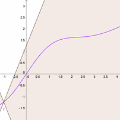Tomographic image reconstruction with deep learning (DL) is an emerging field of applied artificial intelligence, but a recent landmark study reveals that several deep reconstruction networks are unstable for computed tomography (CT) and magnetic resonance imaging (MRI). Since deep reconstruction is now a mainstream approach to achieve better tomographic image quality, stabilizing deep networks is an urgent challenge. Here we propose an Analytic Compressive Iterative Deep (ACID) framework to address this challenge. Instead of only using DL or compressed sensing, ACID consists of four modules: deep learning, compressed sensing-inspired sparsity promotion, analytic mapping, and iterative refinement. This paper shows the convergence and stability of ACID under a bounded error norm condition (a special case of the Lipschitz continuity), improves deep reconstruction quality by stabilizing an unstable deep reconstruction network in the ACID framework, and demonstrates the power of ACID in both stabilizing an unstable network and being resilient against adversarial attacks to the whole ACID workflow. In our experiments, ACID eliminated all three kinds of instabilities and significantly improved image quality in the context of the aforementioned study on the instabilities, demonstrating that data-driven reconstruction can be stabilized to outperform reconstruction using sparsity-regularized reconstruction alone. The mechanism of ACID is to synergize a deep reconstruction network trained on big data, compressed sensing-based improvement with kernel awareness, and iterative refinement to eliminate any data residual inconsistent with real data. We anticipate that this integrative closed-loop data-driven approach helps advance deep tomographic image reconstruction methods into clinical applications.
翻译:利用深层学习(DL)进行成像重建是应用人工智能的一个新兴领域,但最近一项具有里程碑意义的研究表明,一些深层重建网络在计算成成像和磁共振成像(MRI)方面不稳定。由于深层重建现在是提高成像图像质量的主流方法,稳定深层网络是一项紧迫的挑战。我们在这里建议采用分析压缩压缩透析深深深层(ACID)框架来应对这一挑战。ACID不仅使用DL或压缩感应,而且由四个模块组成:深层学习、精密遥感启发的孔隙推进、分析绘图和迭接改进。本文显示,ASID在受限制的错误规范条件下(Lipschitz连续性的一个特例),正在通过稳定一个不稳定的深层重建网络来提高深层网络的质量。 我们的实验中,ACID消除了所有三种类型的不稳定性和大幅改进的图像质量。 ASID在进行上述的重建中,利用经过训练的不断稳定化的不断稳定的数据,可以将数据转化为不断稳定化的重建机制。





